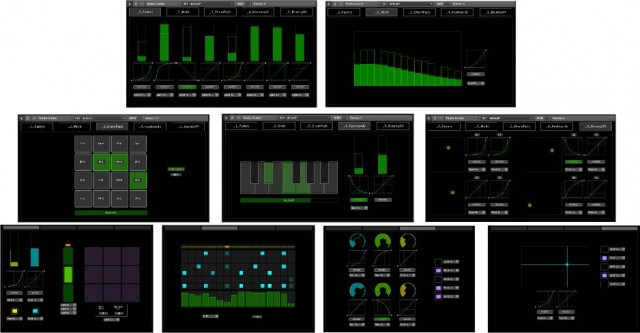Got a copy of Reaktor 5, perhaps via Komplete, or an instrument or effect based on Reaktor (running in Reaktor Player)?
Got an iPad, and want to start touching sounds with OSC?
Great! We’ve got some powerful tools and references that will make it easy to get going – and, for those who want to peek under the hood, can yield some nice tools for your own creations.
Actually, maybe “un-exclusive” is the best way to describe this. In addition to official references from Native Instruments on how to use the tools, developer Clément Destephen has built templates that make connecting Reaktor patches to popular iOS touch apps easier and deeper. Clément’s day job is at Native Instruments here in Berlin, but working with Clément, we’re glad to say that he has made the templates available under a GPLv3 license. That means you’re free to use them, learn from them, modify them, and share your modifications. (Patchers, you can even “fork” the project on GitHub if you have ideas for what to do with them.)
The templates are richly powerful for working with TouchOSC and Lemur, two of the most popular control apps. But before we get there, let’s start with NI’s official guide to using OSC in Reaktor.
Setup Guides
Your first reference should be the general MIDI and OSC mapping guide – and, in fact, MIDI mapping has improved greatly in this release, too:
How to map MIDI and OSC controllers in REAKTOR 5.8
There are specific guides for two apps, though, in TouchOSC and Lemur.
How to set up TouchOSC with REAKTOR 5.8 (Mac)
How to set up TouchOSC with REAKTOR 5.8 (Windows)
How to set up Lemur with REAKTOR 5.8 (Mac)
How to set up Lemur with REAKTOR 5.8 (Windows)
While specific to those tools, these instructions are reasonable guidelines for other software, too.
Check the developer sites for those two apps, as well:
Hexler’s TouchOSC
Go Deeper with the Templates
If you do have TouchOSC or Lemur, Clément’s templates serve a number of purposes. Used as-is, you get templates that take common layouts of controls and make them easy to map to parameters. Using embedded panel object sends and receives, you can route controls to wherever you like.
Secondly, you get a set of nice objects that allow you to adjust interpolation curves.
Go a little deeper in Reaktor, and it keeps getting cooler. Those interpolations are each saved in snapshots. That means you can create a set of performance snapshots that each let you dial in control of certain parameters – a particular part of a filter, for instance, for one section, then a larger filter area with a different grain size with another.
When you’re ready to build your own performance layouts, all of these features are built into well-organized, easy-to-use macros you can drop into your own Reaktor patches. Even if you’re a relative novice working with Reaktor, they’re logical enough that basic copy-and-paste patching skills will be enough for you to get use out of them.
Using internal MIDI, you can easily combine this with drumpads and keyboards, too.
Out of the box, there are ensembles set up for the StudioCombo – using instruments Junatik and SpaceDrone (with Lemur) and Beatmachine with the MemoryDrum2 drum machine (with TouchOSC).
Download
If you’re comfortable using GitHub, head to:
https://github.com/clement-destephen/Reaktor-OSC-Templates/
If you just want the download, grab it here as a cross-platform zip with all the files you’ll need:
Reaktor OSC Templates
This seems just the start. Clearly, a lot of the Reaktor developer community is going to be all over this, having already worked hard to hack OSC control support in the previous Reaktor versions.
Let us know what you think, do share what you create, and have fun out there.
